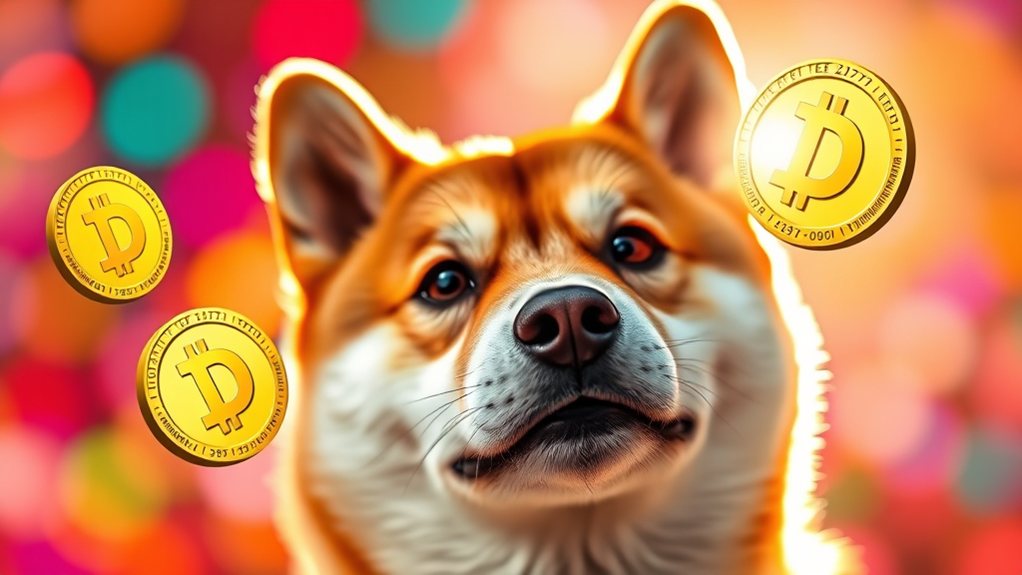Dogecoin is a cryptocurrency created in 2013 by Billy Markus and Jackson Palmer based on the "Doge" Shiba Inu dog meme. It started as a joke but grew into a digital currency with a supportive community following the motto "Do Only Good Everyday." Dogecoin has funded numerous charities and gained fame through Elon Musk's endorsements. Despite its unlimited supply and price volatility, it remains popular for online tipping and small payments. The coin's evolution continues to surprise skeptics.

What began as a simple internet joke has evolved into one of the world's most recognized cryptocurrencies. Dogecoin was created in December 2013 by software engineers Billy Markus and Jackson Palmer as a playful alternative to Bitcoin. They based it on the popular "Doge" meme, which features a Shiba Inu dog with colorful text in broken English. Unlike many cryptocurrencies, Dogecoin wasn't meant to be serious – it was designed to be fun and accessible.
From internet meme to financial phenomenon, Dogecoin proves that sometimes the best innovations start as jokes.
Technically, Dogecoin is a fork of Litecoin that uses the Scrypt algorithm and a proof-of-work system to verify transactions. It has a faster block time of just one minute compared to Bitcoin's ten minutes. Each block rewards miners with 10,000 Dogecoins. Unlike Bitcoin's limited supply, Dogecoin is intentionally inflationary with no maximum cap. Currently, over 132 billion Dogecoins are in circulation.
The Dogecoin community quickly gained a reputation for generosity. Their slogan, "Do Only Good Everyday," reflects their commitment to positive action. They've funded numerous charitable projects, including sending the Jamaican bobsled team to the 2014 Winter Olympics, sponsoring NASCAR driver Josh Wise, and building wells in Kenya. This giving spirit helped Dogecoin stand out in the cryptocurrency world.
In 2021, Dogecoin experienced explosive growth. Its price reached an all-time high of $0.74 in May, pushing its market capitalization beyond $80 billion. This surge was partly due to endorsements from celebrities, most significantly Elon Musk, who called Dogecoin his favorite cryptocurrency and later announced that Tesla would accept it for merchandise purchases. The cryptocurrency saw a dramatic 400% price increase in a single week during April 2021, raising concerns about a potential market bubble. Dogecoin even briefly became the most traded cryptocurrency in 2014, showing its early popularity despite its humorous origins.
Dogecoin serves several practical purposes. It's used for tipping content creators online, making small payments for goods and services, and donating to charities. Its low transaction fees make it suitable for micropayments that would be impractical with traditional payment methods or even Bitcoin.
Despite its popularity, Dogecoin faces challenges. Critics point to its unlimited supply as a potential issue for long-term value. The coin's price remains volatile, often fluctuating dramatically based on social media trends and celebrity mentions. Some financial experts question its fundamental utility beyond its meme status. Dogecoin inspired other memecoins like Shiba Inu (SHIB), which emerged in 2020 as a Dogecoin parody operating on the Ethereum blockchain.
In 2021, the Dogecoin Foundation relaunched with Ethereum creator Essential Buterin as an advisor, signaling a more serious approach to development. Today, Dogecoin consistently ranks among the top 20 cryptocurrencies by market capitalization and maintains high trading volume on major exchanges.
What started as a joke now represents an interesting case study in how internet culture can create real financial impact. Dogecoin demonstrates that in the digital age, community enthusiasm and brand recognition can sometimes be as valuable as technical innovation.
Frequently Asked Questions
How Secure Is Dogecoin Compared to Bitcoin?
Dogecoin is less secure than Bitcoin in several key areas.
It uses the Scrypt algorithm, which isn't as robust as Bitcoin's SHA-256. With a smaller network, Dogecoin faces higher risks of 51% attacks. Its faster block time creates more orphan blocks, reducing security.
Bitcoin's larger developer community provides more regular updates and security fixes. Bitcoin also offers better wallet options and greater market stability, making it the more secure cryptocurrency overall.
Can Businesses Accept Dogecoin as Payment?
Yes, businesses can accept Dogecoin as payment. Over 2,500 merchants worldwide now take DOGE, including big names like Tesla and AMC Theaters.
Companies can implement DOGE payments through wallet transfers, payment processors like BitPay, or e-commerce plugins. It's attractive to businesses due to low fees and fast transactions.
However, they'll need to manage challenges like price volatility and varying tax requirements.
What Influences Dogecoin's Price Volatility?
Dogecoin's price volatility is influenced by several key factors.
Elon Musk's tweets and social media trends often spark rapid price movements. The coin's large supply and regular inflation rate affect its stability.
Bitcoin's price patterns typically impact Dogecoin's value. Technical trading indicators signal potential price changes.
Market sentiment across the broader cryptocurrency space plays a major role. Whale activity, where large holders buy or sell, can cause significant price swings.
Is There a Maximum Supply of Dogecoins?
No, Dogecoin doesn't have a maximum supply.
Unlike Bitcoin's 21 million coin limit, Dogecoin has an unlimited supply with 10,000 new coins created every minute.
This means about 14.4 million new Dogecoins enter circulation daily, or 5.2 billion annually.
The coin originally had a 100 billion cap when launched in 2013, but creators removed this limit in 2014 to guarantee mining remained profitable and replace lost coins.
How Do I Store Dogecoin Safely?
Dogecoin can be stored safely in several ways.
Hardware wallets offer the most security by keeping private keys offline on physical devices like Ledger or Trezor.
Software wallets on phones or computers provide a balance of security and convenience.
Paper wallets store printed keys offline for long-term storage.
Exchange wallets are convenient but riskier since users don't control their private keys.














